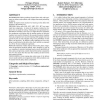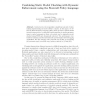799 search results - page 68 / 160 » Generating Reliable Code from Hybrid-Systems Models |
117
click to vote
PROMISE
2010
14 years 9 months ago
2010
BACKGROUND: Defect predictors learned from static code measures can isolate code modules with a higher than usual probability of defects. AIMS: To improve those learners by focusi...
130
click to vote
PTS
1993
15 years 3 months ago
1993
In the area of testing communication systems, the interfaces between systems to be tested and their testers have great impact on test generation and fault detectability. Several t...
139
click to vote
VAMOS
2010
Springer
15 years 9 days ago
2010
Springer
Lack of realistic benchmarks hinders efficient design and evaluation of analysis techniques for feature models. We extract a variability model from the code base of the Linux kerne...
134
click to vote
WCET
2008
15 years 3 months ago
2008
Real-Time embedded systems must enforce strict timing constraints. In this context, achieving precise Worst Case Execution Time is a prerequisite to apply scheduling analysis and ...
125
click to vote
ICFEM
2009
Springer
15 years 9 months ago
2009
Springer
Internet protocols encapsulate a significant amount of state, making implementing the host software complex. In this paper, we define the Statecall Policy Language (SPL) which pr...



